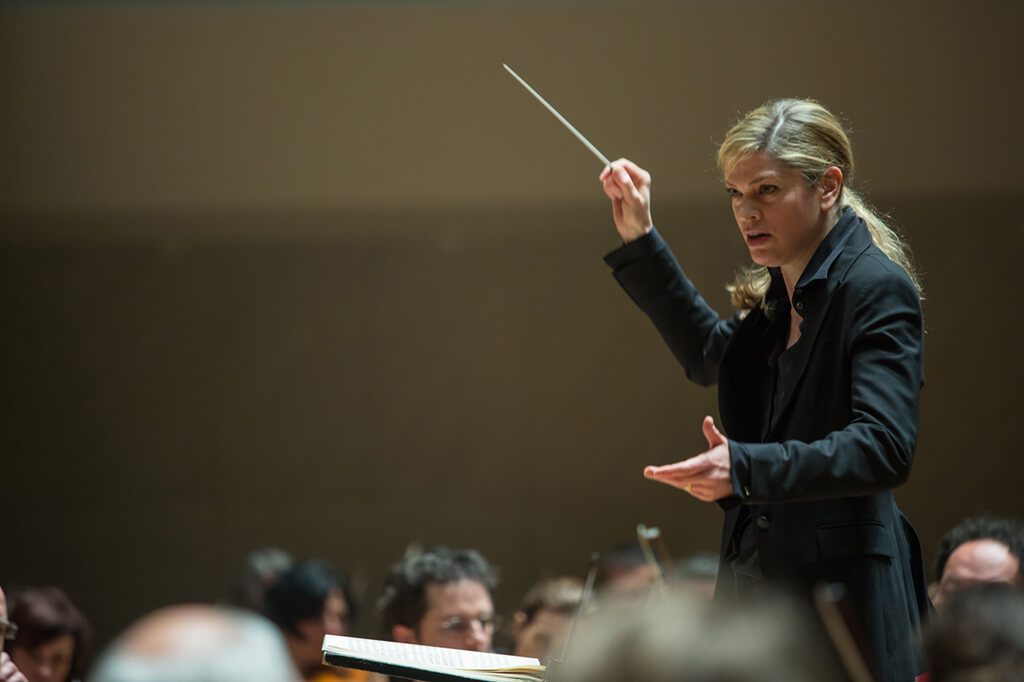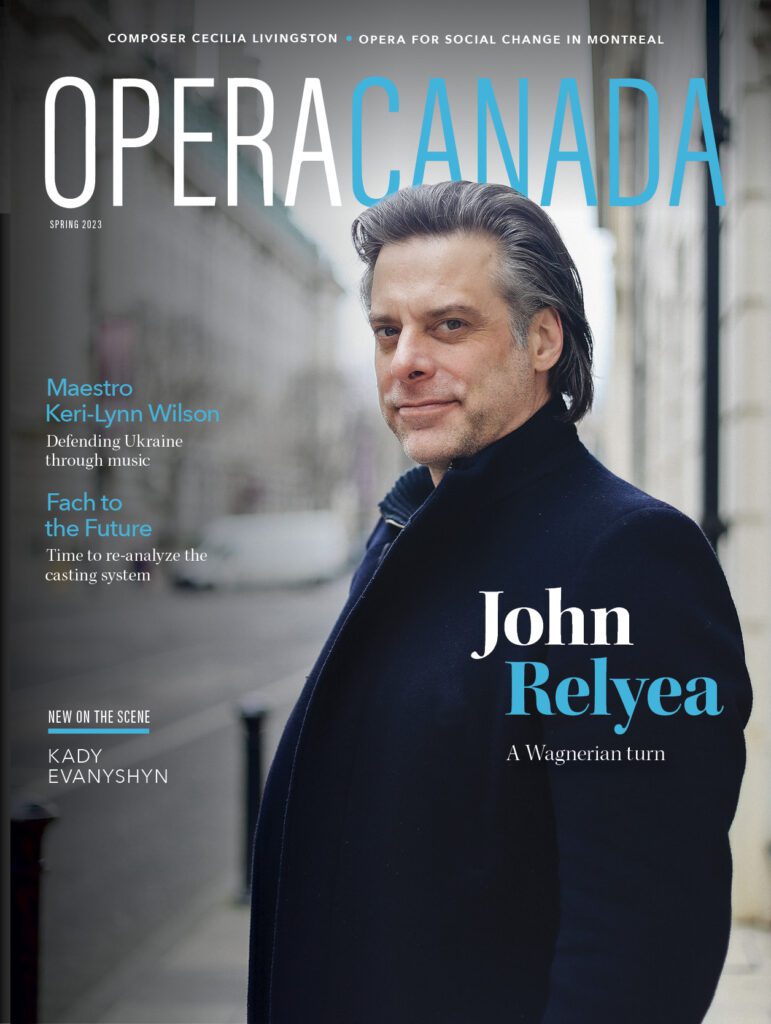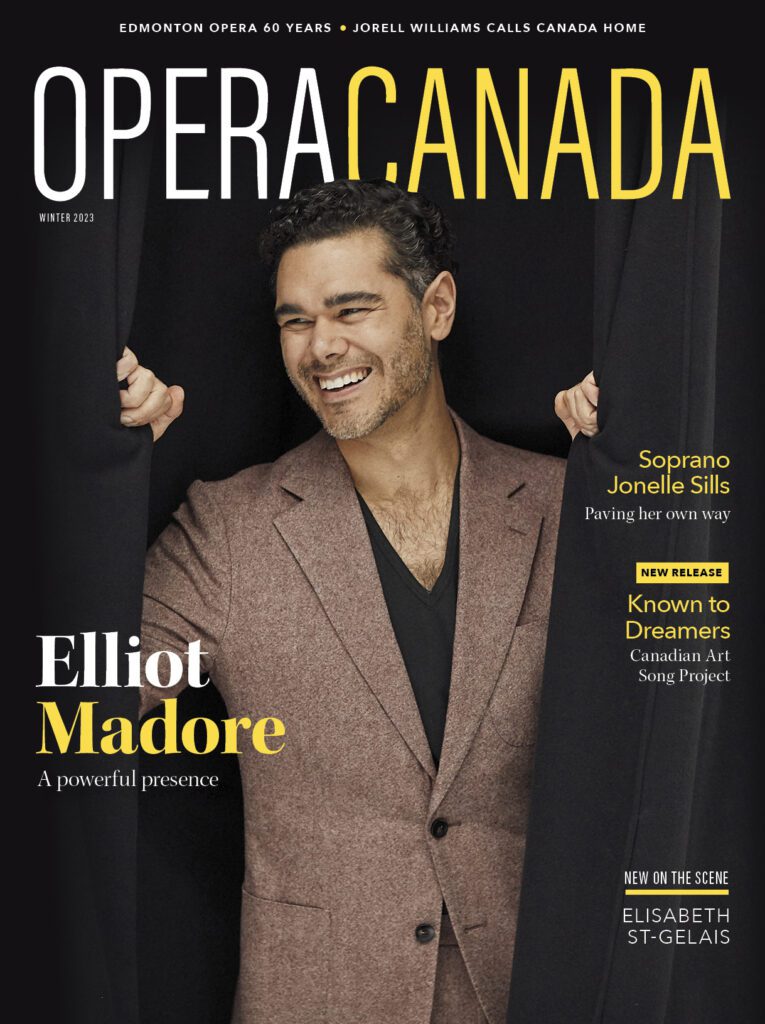SUBSCRIBE TO DIGITAL AND/OR PRINT MAGAZINE
*this text was originally published in the Spring 2023 print version of Opera Canada magazine
Canadian-Ukrainian maestro Keri-Lynn Wilson is creating an experience that strengthens a nation and touches the world. Wilson will conduct Richard Eyre‘s famous La traviata production at the Royal Opera House July 10-23, 2023.
It takes a special strength of will to stay positive in difficult times, and even more determination to share this feeling with others. Conductor Keri-Lynn Wilson found hers most recently by assembling an orchestra of refugee Ukrainian musicians, though it’s likely the resolve was already there. From her family, perhaps, part of whom were Ukrainian and settled in Manitoba, where she was raised. Two grandmothers made it past one hundred years old and she recalls that “they never complained. They might have fallen down the stairs yesterday but it was always, ‘I’m fine!’”
Her father was the conductor of the Winnipeg Youth Orchestra and she grew up helping out in that environment. Eventually, she focused on professional studies in flute that took her to Juilliard, and there she embraced conducting as well, studying with Otto-Werner Mueller and assisting Claudio Abbado while still in school. She took up an assistant conductor post in Dallas after graduating, at a time when there were even fewer women on the podium than today.
Thirty years later, she’s led orchestras including the San Francisco Symphony, the LA Phil, the Bavarian Radio Symphony Orchestra, the Russian National Orchestra, the Prague Philharmonic, the Ravinia Festival Orchestra, the Orchestra national d’Ile de France, and closer to home, the TSO and OSM. In the spring, she conducted Salome at the Houston Grand Opera (April 28 – May 12 *read our review here), and after that she returns to Covent Garden for La Traviata (July 10 – 23). The new year promises an abundant symphonic harvest too, including appearances with the Orchestre national Bordeaux Aquitaine, Wrocław Philharmonic, the Lithuanian National Orchestra, and the NHK Symphony Orchestra in Tokyo.
When Russia invaded Ukraine in 2022, Wilson felt that she must do something. “To fight the war on the cultural front. To galvanize audiences and get people behind Ukraine.” She doesn’t often bring up being married to Peter Gelb, General Director of the Metropolitan Opera—which is a smart move since she’d be the only member of that power couple at risk of even a hint of nepotism, though her debut at the Met only came last year when she conducted Lady Macbeth of Mtensk—but in telling the story of the origin of the Ukrainian Freedom Orchestra, he gets credit for supporting her idea immediately and organizing the logistics. The orchestra exists through a collaboration with the Met and the Polish National Opera.
Wilson conceived of the Freedom Orchestra not as a regular ensemble but as a tour that would bring together Ukraine-based musicians, recent refugees, and Ukrainian members of European Orchestras. The 2022 tour was astonishing given how fast it had to be put together: Warsaw, the BBC Proms in London, Edinburgh, Berlin, Munich, Hamburg, Dublin, Amsterdam, New York City and Washington D.C. You’ll notice the absence of Ukrainian venues. Beyond the obvious safety issues, this is also because military-age men with Ukrainian passports must apply for special visas to leave the country.
The “tour was the mission,” as she puts it, with an echo of military language, but the response from audiences was so strong and the quality of the orchestra was so “surprisingly good, there was no way we could call an end to it.” Surprising, I think, in the sense that many of the musicians had not played together before, recently fled their country, and lived with constant fear and anxiety, in conditions of great uncertainty. Critics have remarked on audiences’ emotional responses to the orchestra, but surely its most commendable achievement has been giving 74 musicians a way of healing together through music.
And they will return this year for another tour, but they started in a symbolic collaboration with the Lviv National Opera Orchestra on the anniversary of the invasion. Symbolic because, the travel restrictions for men are still in place so the orchestra will be represented symbolically in Ukraine by their concertmaster Marko Komonko, now based in Stockholm and exempt from conscription because he is a father. They will perform Verdi’s Requiem and Victoria Poleva’s searing Bucha. Lacrimosa for violin and orchestra, which premiered in 2022 with the orchestra of the Lviv Opera. The full Freedom Orchestra will assemble in August at the Lucerne festival, the Paris Philharmonie, the Concertgebouw, and end their second tour with a filmed performance of Beethoven’s Symphony No. 9 in Warsaw.
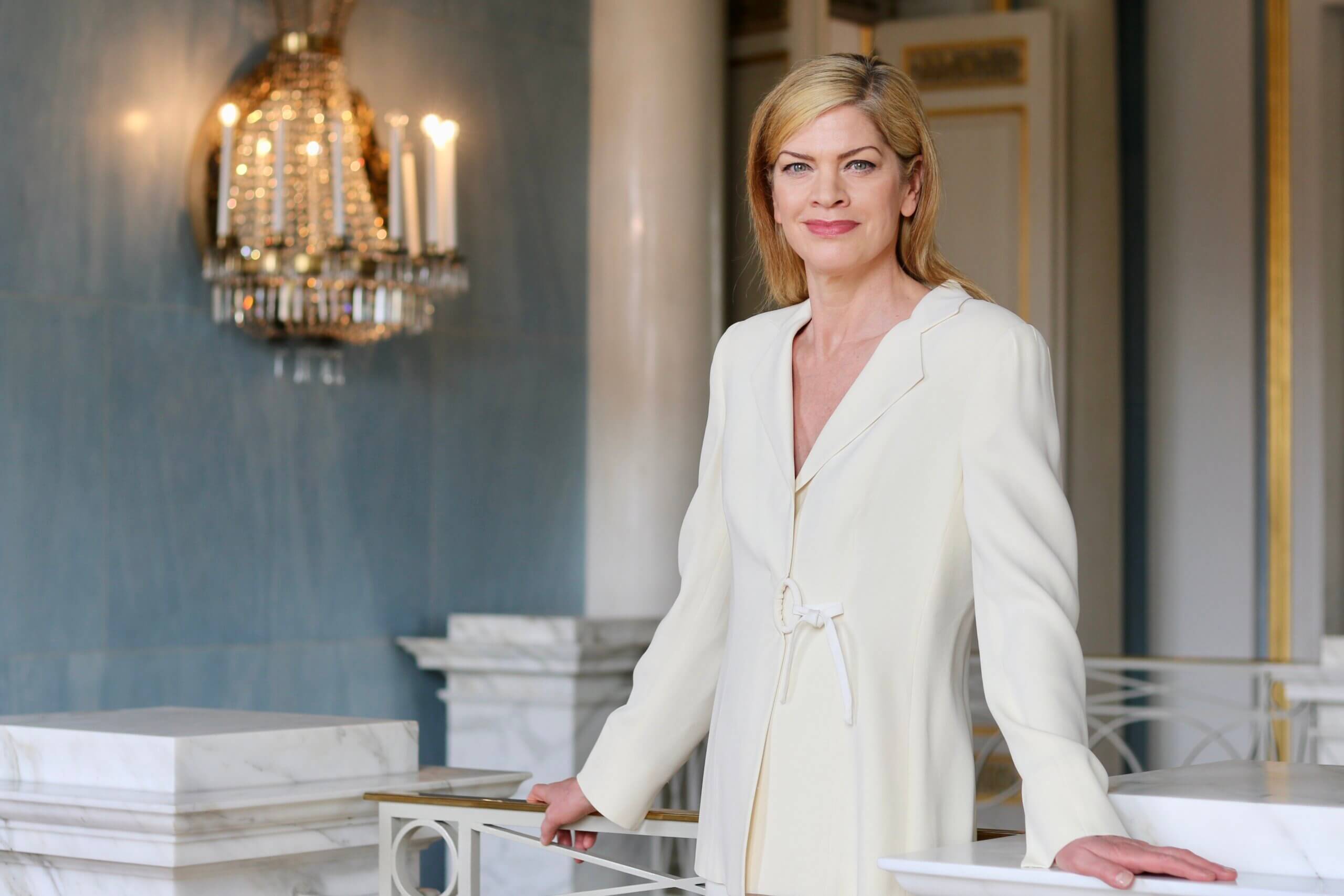
Ⓒ Olivia Kahler
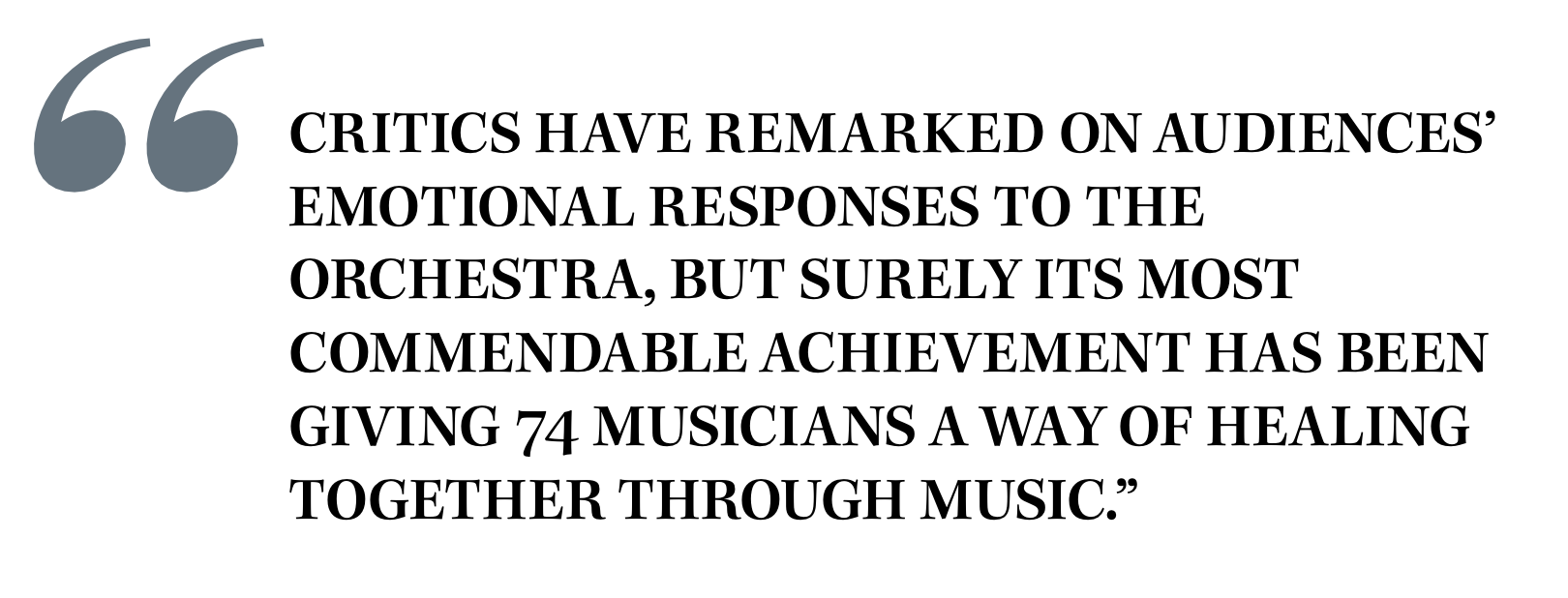
Hearing Wilson talk about the orchestra is a high contrast conversation that swoops from the abstract and musical to the sobering and mundane. The first tour connected her to a cousin she knew about but hadn’t met, and now they text daily, with Wilson making an effort to share positive news. Getting closer to Ukrainians also meant getting requests for equipment and shopping online for bullet proof vests, seeing a constant feed of frightening information and images, and worrying about friends and relatives on the front lines. She is one of many people who have found a new or galvanized relation to their Ukrainian heritage since the Russian attack.
What acting on these feelings means in the musical world can be hard to figure out. America has an almost unbroken record of invading other countries but it is rare to find a musician or conductor who refuses to perform there, largely because internal dissent is not repressed so violently as it is in, say, Russia. A few more might decline to perform in Israel, perhaps, or China. At the extreme of this scale of moral discomfort are the outright pariahs like North Korea and Russia, and even performing alongside musicians from those countries can be complicated.
Wilson made headlines when she refused to conduct Anna Netrebko in Tosca at the Teatro Colón in Buenos Aires, but she did conduct Ekaterina Semenchuk in Bordeaux. Netrebko was once a vocal supporter of Putin, while Semenchuk has just continued performing in Russia, sometimes alongside conductor and Putin supporter Valery Gergiev. Gelb let Netrebko withdraw from Turandot at the Met and then removed her from Don Carlo, later saying he’d be open to her return after she had “demonstrated remorse, such as by performing benefit concerts for Ukraine.” If punishing outright support is justified but guilt by mere association goes too far, what about many artists who do not have the choice of other passports or the means to leave the country?
“We have to use our best judgement based on facts,” says Wilson, measuring her words even more carefully than usual. “And the facts that certain artists have been associated closely with Putin is something I just can’t ignore… Some things are more nuanced: artists might work at the Bolshoi, the Mariinsky, and they have families there. Their lives would be turned upside down if they left. They have nowhere to go and may not be able to express their anger towards the government.”
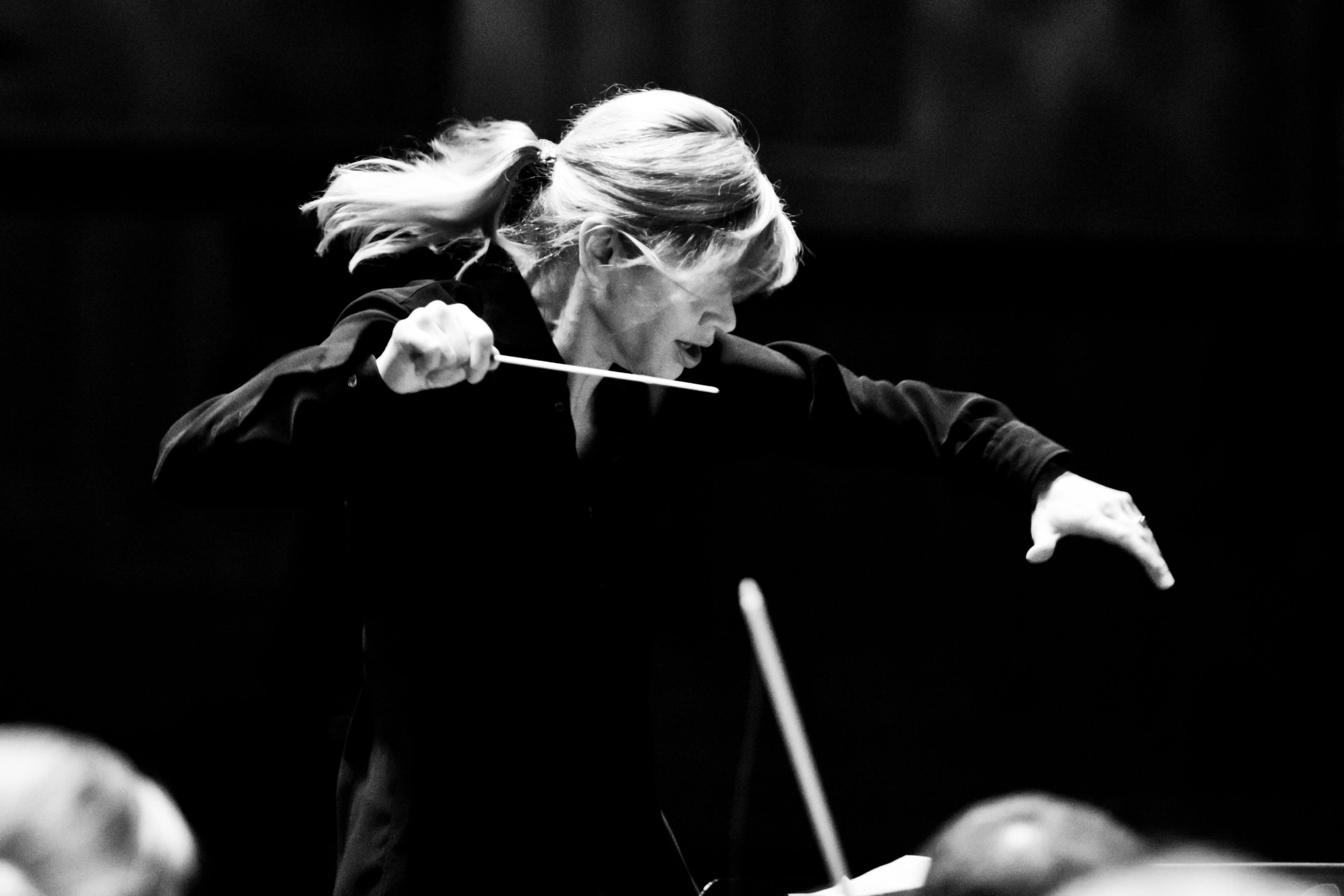
Ⓒ Olivia Kahler
The Ukrainian Freedom Orchestra will tour August 20 to September 3, 2023. They will visit cities in Poland, Germany, France, the UK, the Netherlands, and the USA.
It takes a lot of thought to navigate such questions, but at the furthest distance from reason have been reactions against Russian repertoire, as if just playing the music somehow contributes to the wrong side of the war. “Poor Pushkin! Poor Dostoevsky! Poor Tchaikovsky! They would have been horrified by the way.” Wilson exclaims. She won’t stop performing Russian music, but believes in taking care of the sensitivities of different audiences. With Ukrainian first lady Olena Zelenska now the official patron for the Freedom Orchestra, Wilson says it would be impossible for the orchestra to perform Russian music. But she has also had Russian pieces taken out of programs in Europe against her wishes. And she faced some criticism after conducting Lady Macbeth of Mtsensk at the Met. “Some Ukrainians weren’t happy with it, but they know I’m with them.” It is the outrage and the hurt of the victims that demands the most respect. “Ukrainians are traumatized, they have an excuse.”
Then she says something that I almost never hear from a Westerner. “We’re all guilty, we should have reacted in 2014 and we let it get out of control.” It’s true, there is something of a guilty conscience in the explosion of support and anger at Russia, which was supporting a grim proxy war in eastern Ukraine for years before the invasion. Remorseful anger can easily run out of control and turn dark, which is why the Ukrainian Freedom Orchestra stands as a particularly hopeful example of how hurt and rage can be directed towards noble ends; towards gathering together and celebrating life.
Which, by way of association, brings to mind some of the stereotypes that surround the orchestral conductor: wrathful, exigent, taking out their psychic trauma on captives in the pit. If Todd Field’s film “Tár” has recently given this cartoon an unhelpful boost, that doesn’t mean it’s not worth talking about how one should behave with that much power. Conducting is also a role with some heavy patriarchal baggage; the most pointed critique of Cate Blanchett’s conductor character in the film is that she behaves exactly as a 20th century misogynist would expect her to, hurting others with her out of control emotions, when historically it is overwhelmingly male conductors who have been the ones harming the musicians and students they were meant to guide.

It is not a topic that Wilson cares to explore at length. “I’ve seen it… back in the days when they got away with it.” She has lived through a cultural shift in acceptable behaviour as well as a growth in awareness of how many structural barriers need to be lifted to address racial and gender inequities. But it is still unevenly distributed; most advanced in the US and the UK, while there are more “dictators at the podium” in some countries, like Russia, than in others. “If there’s anything negative, I like to brush it off.” She explains.
Better to focus on the positive potential for her role; on the ability of the conductor to inspire rather than to punish, and to pursue the belief that hard work and openness will overcome resistance. Asked about the new generation of women on the podium like Jessica Cottis, Lidiya Yankovskaya, Olivia Clarke, Oksana Lyniv, in their 30s and 40s, and her relation to them, she says, “I hate when women are referred to as ‘women’ conductors,” she says. “I’ve never been pushing feminism. I hope you like me, and if not, I hope it’s not because I’m a woman.” She speaks about her authority on the podium as coming from knowledge and preparation. “I’m empowered by knowing what I want and hopefully being able to communicate it while maintaining my integrity.”
Her advice for all young conductors, whatever their gender, is the same: work, be prepared, and get as much experience as you can. Never compromise your integrity. At the end, she laughs. “I’m not an angry person, except at Putin.”

